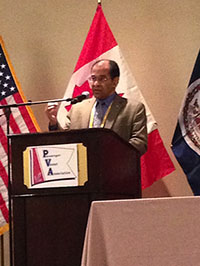The workboat industry and other commercial transport modes are a round-the-clock business. Unfortunately, people aren’t built that way.
“The basic disconnect of fatigue is fairly simple. Most commercial transportation is 24/7, and humans aren’t,” said Christopher Hart, chairman of the National Transportation Safety Board.
NTSB Chair Christopher Hart. David Krapf photo.Hart, who addressed the Passenger Vessel Association annual meeting in Washington, D.C., today, said certain issues like the effect of sleep on fatigue are well developed and can be measured, but others, such as lifestyle issues, are not. “What do we know about the effects of diet, exercise, drinking, smoking, age, stress, some of those issues that we’re not so well versed on and we’re early on in the learning curve?”
Hart also mentioned shift changes. The effects, he said, “could be huge” but aren’t well studied. Another issue that is tough to measure is the effect of fatigue in life threatening situations. “Does the adrenaline rush actually undermine the effects of fatigue? For the moment, we don’t know that and there’s really no way to experiment and find out exactly what the effects are. Fatigue presents a lot of issues for us because it’s difficult to measure.”
The NTSB is pushing for fatigue management programs that look at the total picture, including when people are home and off work. “It’s a holistic look at the total situation. It’s a big challenge for us and a big challenge for all modes.”
Hart also discussed the impact personal electronic devices are having on the industry and commercial transportation. “Unfortunately we now have fatal accidents in every mode due to personal electronic devices.”
The NTSB chairman touched on the worst PED maritime accident thus far — the 2010 Philadelphia duck boat incident on the Delaware River that killed two tourists.
“Texting is the worst example of all because it involves manual, visual and cognitive distraction,” Hart said. On highways, “you are 23 times more likely to have a crash if you’re texting than if you’re not.”
So get some sleep, and put away your phones already.





